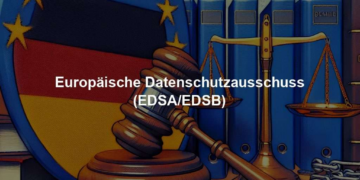No products in the cart.
Introduction
The European Data Protection Board (EDSA), also known by its English abbreviation EDPB (European Data Protection Board) or its German abbreviation EDSB (Europäischer Datenschutzboard), is an independent European body that helps to ensure a consistent level of data protection throughout the European Union (EU). The EDSA plays a crucial role in the application of the General Data Protection Regulation (GDPR) and helps to ensure that data protection rules are interpreted and applied consistently across all EU member states.
Key Facts
- EDPB ensures a uniform level of data protection in the EU, which is crucial for the application of the GDPR.
- Founded in May 2018, the EDPB replaces the Article 29 Working Party.
- Guidelines and recommendations on the GDPR are central tasks of the EDPB.
- The EDPB resolves disputes between national data protection authorities.
- Advises the European Commission on data protection issues and legislation.
- International cooperation with data protection authorities in third countries is promoted.
- The EDPB faces challenges from technological developments and cooperation between member states.
History and foundation
The European Data Protection Board was established with the introduction of the General Data Protection Regulation (GDPR) in May 2018, replacing the Article 29 Working Party, which previously acted as an advisory body on data protection issues. The EDSA was created to ensure more effective and consistent application of data protection rules in the EU.
Tasks and responsibilities
EDSA has a variety of duties and responsibilities, including:
- Consistent application of the GDPR: The EDSA helps to ensure that data protection rules are applied consistently across the EU.
- Guidelines and recommendations: The Committee shall issue guidelines, recommendations and best practices on the application of the GDPR.
- Dispute resolution: The EDSA acts as a dispute resolution body when national data protection authorities have different views on how to handle a cross-border case.
- Advice on legislation: The Committee advises the European Commission on data protection issues and issues opinions on planned legislation.
- International cooperation: EDSA promotes cooperation between data protection authorities in EU Member States and cooperates with data protection authorities in third countries.
Structure
The EDSA is composed of representatives of the national data protection authorities of the EU Member States and the European Data Protection Supervisor (EDPS). The Committee shall elect a Chairperson and two Vice-Chairpersons from among its members.
Importance and challenges
EDSA plays a crucial role in safeguarding the data protection rights of citizens in the EU. It ensures that companies and organizations that process personal data do so in compliance with the strict rules of the GDPR. However, the EDSA also faces challenges, such as the need to keep pace with rapid technological developments and ensuring effective cooperation between data protection authorities in different Member States.
Conclusion
The European Data Protection Board is a central body for data protection in the European Union. By providing guidance, mediating disputes, and promoting cooperation, EDSA helps strengthen the level of data protection in the EU and protect citizens’ rights.





















